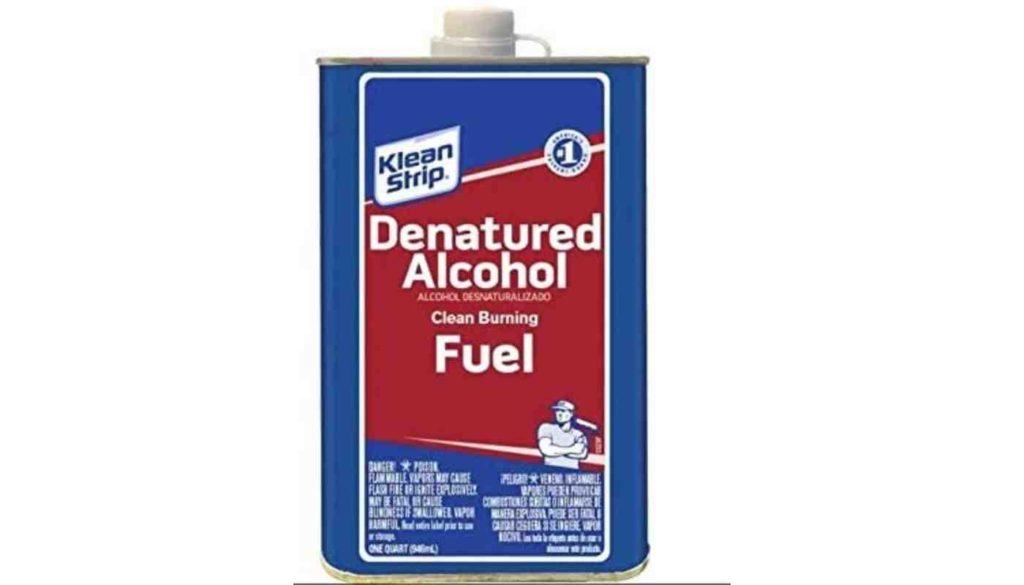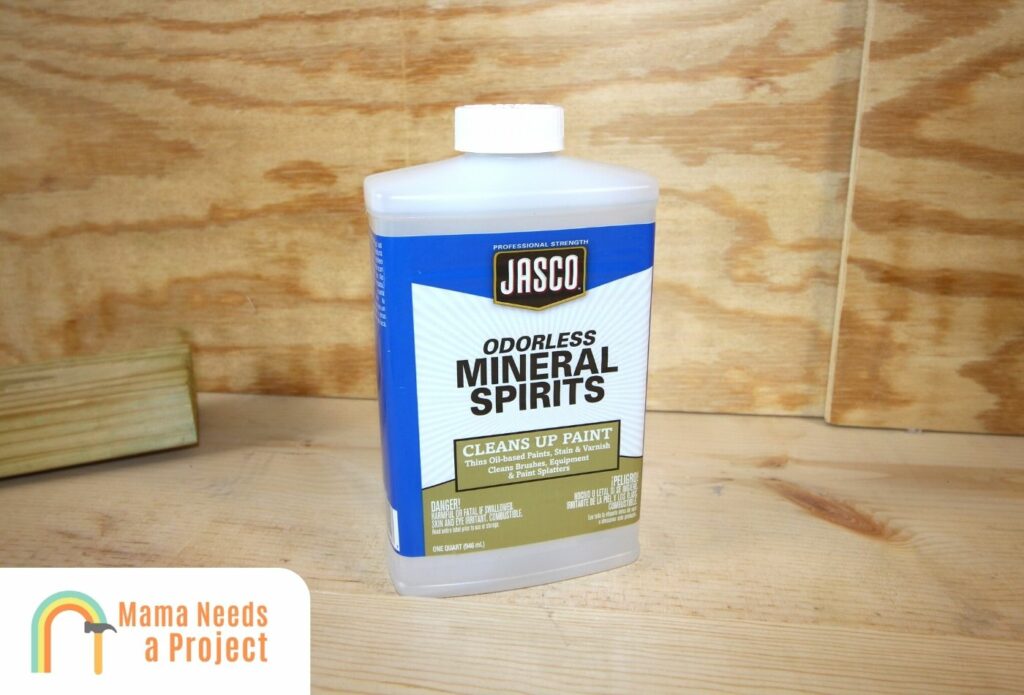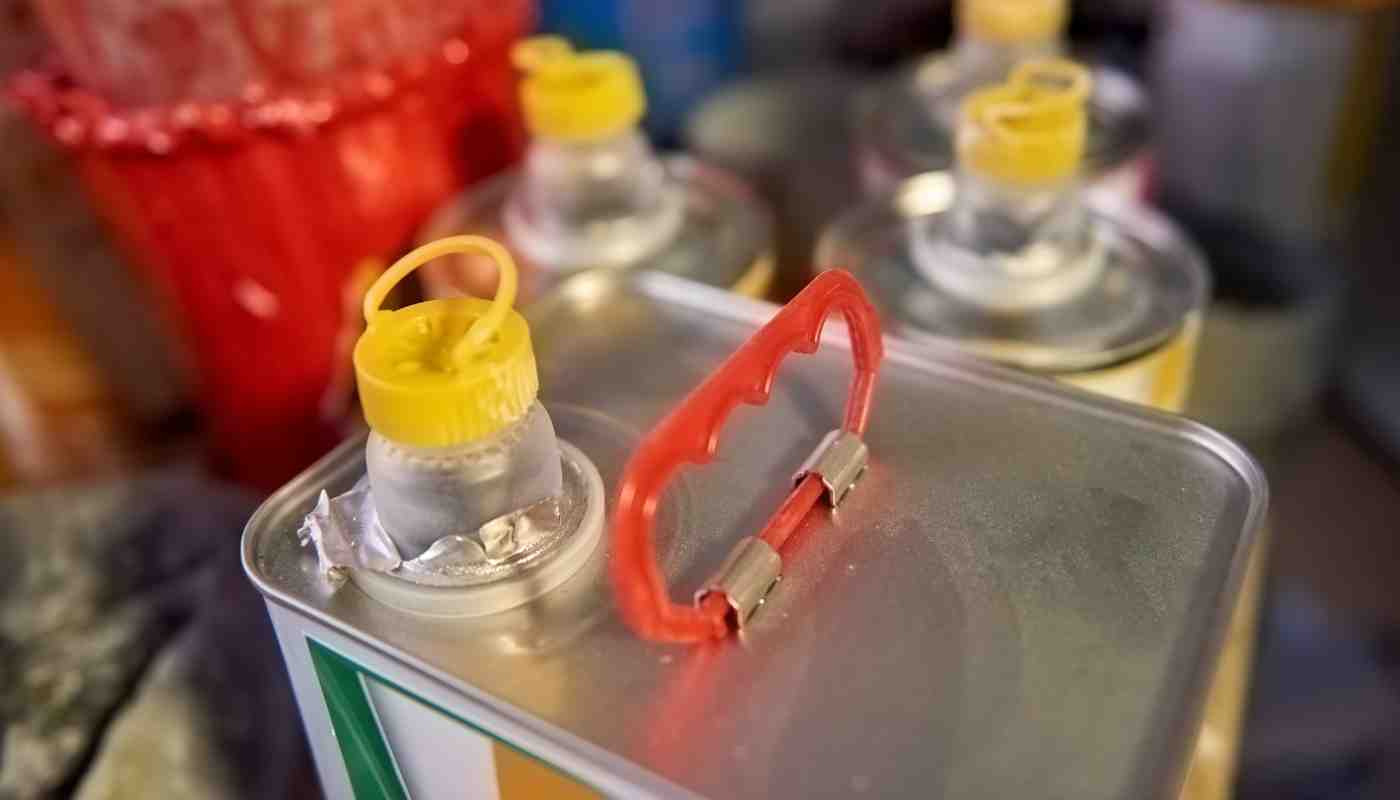Denatured Alcohol vs Mineral Spirits: What’s the Difference? (2024 Guide)
When it comes to woodworking, there’s a good chance you’ll run into the need for mineral spirits or denatured alcohol at some point.
But what’s the difference exactly?
Can you use either of them, or do you need a specific one?
Both of these solvents can be extremely handy to have on hand when woodworking or completing other DIY projects, but it’s helpful to know which one will work best for you.
In this post, I’ll explore denatured alcohol vs mineral spirits, which one you should use, and much more. Let’s get started!
What Is Denatured Alcohol?

Denatured alcohol is a type of ethanol mixed with chemical substances that make it dangerous for humans to consume.
It’s ethyl alcohol, different from isopropyl alcohol because it has not been chemically altered.
Denatured alcohol is clear-colored naturally, but additives are added so you can easily identify that the solvent is toxic.
It works for many different purposes, but woodworking is one of the most common.
Thanks to the lack of alteration, you can always use ethanol instead of denatured alcohol if needed.
Denatured alcohol is also exempt from taxes that would be applied if it were an alcoholic beverage that could be consumed.
Related Reading:
What Is Denatured Alcohol Used For?
There are many uses for denatured alcohol in woodworking and beyond.
It comes in handy for cleaning and degreasing machines, washing windows, and even removing sticky substances attaching to automobile parts.
It has an evaporative quality that prevents damage from occurring to the metal it comes in contact with.
Here are some other uses for denatured alcohol:
- Removing ink stains from some types of fabric
- Getting rid of mold and mildew when mixed with water
- Glass cleaning
- Works as a powerful solvent option on wood
There are many practical uses for denatured alcohol in a home, from wood to fabric stains.
Denatured alcohol evaporates without much effort, and it’s a thin product that doesn’t leave an oily residue. In woodworking, it’s one of the best options out there and every woodworker should have this substance on hand.
What Are the Pros of Denatured Alcohol?
Many good qualities come with denatured alcohol that can be very use when woodworking.
These are critical to consider if you consider this product for your next woodworking project. There’s a reason it’s one of the most popular options on the market.
Here are a few of the most prominent good qualities that come with denatured alcohol:
- It’s one of the most powerful solvent options – meaning you can use less of it
- It operates as a fast degreaser
- It dries fast, which saves time on various projects
- Some types have antibacterial properties
- It can be more affordable because there is no included tax on the product
As with anything, it’s critical to consider the bad and the good to make the best decision. Let’s discuss the cons of denatured alcohol to provide a well-rounded picture of the solvent.
What Are the Cons of Denatured Alcohol?
There aren’t as many bad qualities of denatured alcohol as good items but here are some that come with it:
- Denatured alcohol is toxic if consumed by a human or animal
- Denatured alcohol is highly flammable and can easily create a fire
These can be dangerous and are critical to consider before putting denatured alcohol to use in woodworking.
How to Use Denatured Alcohol
When it comes to using denatured alcohol, there are a few steps you should take.
- Always be sure your area is clean and well ventilated to avoid any hazardous conditions
- Pour a very small amount to test on your surface
- Wait a couple of minutes to see if you achieve your desired result
- Use a clean lint-free cloth to wipe around the affected area
- Wait for it to dry – which should take a few minutes
That’s it! Using denatured alcohol is very easy.
What Are Mineral Spirits?

Mineral spirits are a little different than denatured alcohol.
This liquid is petroleum-based, which means they are ineffective for cleaning items made with water or acrylic latex.
Mineral spirits are more refined petroleum products than paint thinners. They are also less toxic than denatured alcohol.
This product works well to clean wood with finishes on top, as it doesn’t dissolve anything already placed over the wood.
You can safely utilize mineral spirits on wood with items like shellac, varnish, lacquer, and polyurethane.
Mineral spirits even can bring new life to a piece of furniture. They operate as thinners that work on the same level as other traditional paint thinner options on the market.
Mineral spirits are similar to denatured alcohol but are not the same thing. One of the contrasts between the two is what mineral spirits are used for in woodworking.
What Are Mineral Spirits Used For?
There are multiple uses for mineral spirits, whether in woodworking or another aspect of life.
They work well as a paint thinner or to clean off paint brushes that have been used to place the liquid in another object.
Odorless mineral spirits are most common, as they contain fewer toxins.
Here are a few other uses for mineral spirit liquid options:
- Cleaning furniture that has a finish, such as a shellac, varnish, lacquer, or polyurethane
- To revitalize the way wood looks
- Clear off natural adhesives
- Removing polyurethane from hands and other surfaces
There are many uses where mineral spirits stand out and many where they overlap with denatured alcohol.
You can also try some of these mineral spirits alternatives for your projects!
What Are the Pros of Mineral Spirits?
Many excellent qualities come with mineral spirits.
These are critical when examining denatured alcohol vs mineral spirits and determining the best choice for your work. Here are a few of the benefits that come with mineral spirits:
- They are often less toxic than similar materials
- Paint thinned with this product dries smoothly and evenly
- Mineral spirits do not have volatile organic compounds
- It’s very good at getting rid of even the toughest stains
Some people prefer mineral spirits for these reasons. However, it’s also critical to consider the poor qualities that come with this solvent.
What Are the Cons of Mineral Spirits?
Several cons come with mineral spirits, as with all products used to treat wood.
It’s vital to consider the bad and the good to make the best choice for your project.
Here are a few negative items that come with mineral spirits:
- It can be flammable and has the potential to cause fire hazards
- It can be irritating to the skin
- Breathing in mineral spirits for too long can damage the brain and lungs
Despite the negative aspects of mineral spirits, it’s still a popular product for those who work with wood. As long as you’re careful, mineral spirits are an excellent product for all your needs.
How to Use Mineral Spirits
When it comes to using mineral spirits, there are a few steps you should take.
- Always be sure your area is clean and well ventilated to avoid any hazardous conditions
- Pour a very small amount to test on your surface
- Wait a couple of minutes to see if you achieve your desired result
- Use a clean lint-free cloth to wipe around the affected area
- Wait for it to dry – which should take a few minutes
Which is the Best for Woodworking?
When determining which of these products is best for woodworking, there are many factors you need to consider.
An examination of each specific item will help you determine which product is the ideal choice for your product.
Ensure you consider the following:
- Drying time
- Uses
- Toxicity
- Residue
- Mixability
I’ll dive into each of these items to help you determine what your project requires.
Drying Time
First, consider the drying time of your wood.
Both offer a variation in the time it takes to dry. If you need the solvent gone right away, you need to pick a different option than if you have time to spare.
Here are the differences in drying time between the two products:
- Denatured alcohol: This product dries almost instantly, preventing damage to metallic and wood materials.
- Mineral spirits: This product takes a few minutes to an hour to dry completely.
Drying time is vital, but it shouldn’t be the sole reason you land on a product. Consider other factors along with the speed of the drying.
Uses
Consider the uses of each product.
You don’t want to select a solvent that excels at a use opposite of what you need for your woodworking project.
There are many uses for each, but let’s discuss what each solvent is best at to determine which you should select for your next endeavor based on wood.
Here are the most prominent uses for each solvent:
- Denatured alcohol: This product works best for thinning shellac. It’s also excellent at removing stains on tools and metal and is one of the best cleaners for glass. In emergencies, it operates as fuel in some cases.
- Mineral spirits: This product works best for thinning oil-based paints, stains, and varnishes. It’s also ideal for removing paint and grease.
If you want to work with metal or thin shellac, select denatured alcohol for your product.
If you desire to thin oil-based products or remove grease, mineral spirits are the better option for your needs.
Toxicity
Toxicity is another factor to consider.
You want to ensure you are not exposed to fumes as you work with each solvent on wood or a similar material.
Here’s what to consider when it comes to toxicity in each product.
- Denatured alcohol: This product can be poisonous and even causes death if ingested. Chemicals go inside to make it taste poor for this reason.
- Mineral spirits: This product is a minor irritant. However, extensive exposure to fumes can cause serious harm.
Wear a mask and gloves when working with either solvent. Ensure you don’t lick your hands or any other action that could cause an ingestion of the materials in your work.
Residue
Finally, consider the residue that each product will leave behind on the wood.
Each has a different impact on the wood.
Denatured alcohol dries fast and won’t leave anything behind. It’s not oil-based, so all of it will evaporate in the drying process.
On the other hand, mineral spirits leave oil behind.
Mixability
Another factor that could determine which solvent you should use is it’s compatibility with water.
Mineral spirits will not mix with water whereas denatured alcohol will mix with water.
This is mainly a factor for using it around your household and less important for when it comes to woodworking.
Final Thoughts on Mineral Spirits vs Denatured Alcohol
When considering a solvent for your woodworking project, denatured alcohol vs mineral spirits is the most common debate.
Although they are similar, they are not the same.
Denatured alcohol is ideal for thinning shellac and removing stains on the glass, but mineral spirits are excellent for oil-thinning and getting rid of grease.

